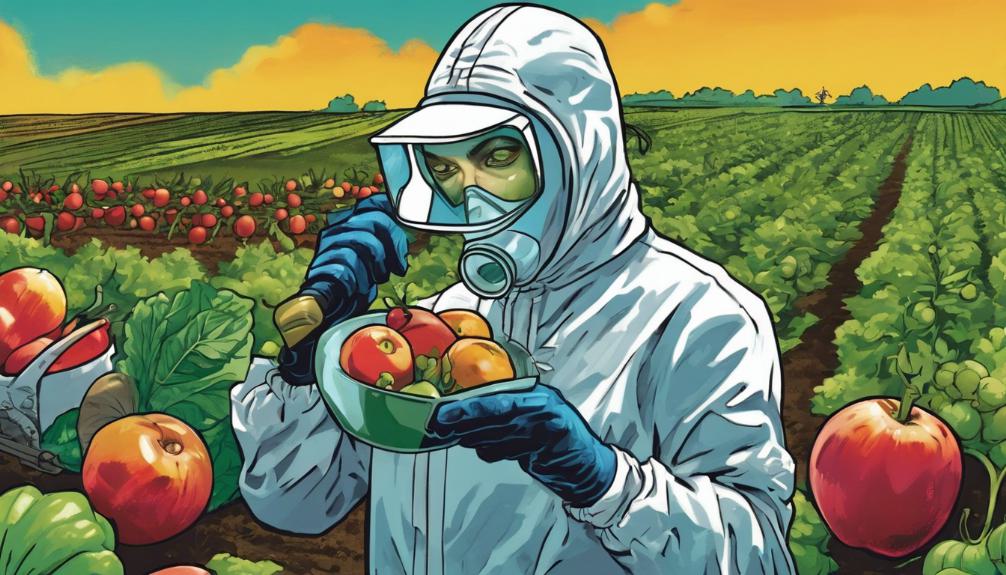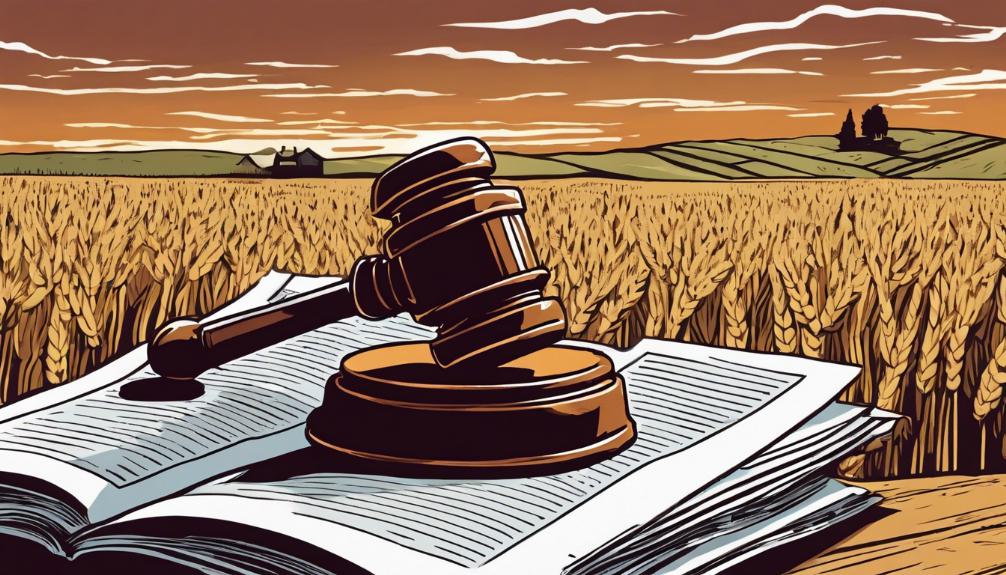Glyphosate Lawsuit: Were You Diagnosed With Blood Cancer or Lymphoma After Being Exposed to Glyphosate
In recent years, the use of glyphosate, a prevalent herbicide found in products like Roundup, has come under intense scrutiny due to its potential link to blood cancers, including non-Hodgkin's lymphoma. This connection has precipitated a surge in legal actions against Monsanto/Bayer, the chemical's main producer, by individuals alleging that their illnesses were directly caused by exposure to glyphosate. As courts across the globe grapple with these claims, the outcomes could set significant precedents for public health policies and corporate accountability. This discussion seeks to explore the intricate legal, medical, and ethical dimensions surrounding the glyphosate controversy, offering a comprehensive understanding of its implications for both affected individuals and the broader society.

Glyphosate Lawsuit Explained
The glyphosate lawsuit pertains to legal claims filed by individuals alleging that exposure to glyphosate, predominantly through Roundup products manufactured by Monsanto/Bayer, led to the development of Non-Hodgkins Lymphoma. This litigation underscores the growing concerns surrounding the safety of glyphosate, an herbicide widely used across various sectors, including agriculture, forestry, and residential gardening. As the number of lawsuits continues to rise, the central argument hinges on the alleged failure of Monsanto/Bayer to warn users about the cancer risks associated with glyphosate exposure. The legal proceedings have attracted significant attention, spotlighting the debate over glyphosate's carcinogenic potential and the responsibilities of manufacturers in ensuring the safety of their products. This contentious legal battle underscores the broader public health and safety concerns associated with chemical exposure in everyday products.
Identifying Glyphosate Products

Identifying glyphosate products involves recognizing various brands and formulations that contain this widely used herbicide. Glyphosate, the active ingredient in a plethora of weed control products, is not limited to a single brand or application type. It's found in products ranging from agricultural herbicides to residential weed killers. Key examples include Eliminator Weed & Grass Killer, Knockout Weed & Grass Killer, Acquire Herbicide, and Mad Dog I Glyphosate. Each product varies in concentration and formulation, designed for specific uses across agriculture, forestry, and residential areas. Understanding the diversity of glyphosate-containing products is crucial for consumers, especially those in occupations with heightened exposure risks, to make informed decisions about their use and potential health implications.
Recognizing Exposure Risks

Understanding the diverse environments and activities that may lead to glyphosate exposure is essential for minimizing health risks associated with this chemical. Individuals working in agriculture, such as farmworkers and those involved in planting, cultivating, and harvesting crops, are at a higher risk. Similarly, landscaping and groundskeeping workers, along with pesticide handlers and applicators, face significant exposure risks due to their direct contact with glyphosate-containing products. Exposure is not limited to professional settings; it can also occur in residential areas where products containing glyphosate are used for lawn and garden maintenance. Recognizing these exposure risks is crucial for taking preventative measures and ensuring the safety of those who may come into contact with glyphosate in their daily activities.
Health Risks of Glyphosate

Given the widespread use of glyphosate in various agricultural and landscaping practices, concerns have been raised regarding its potential health risks, particularly its association with an increased risk of non-Hodgkins lymphoma. The World Health Organization has classified glyphosate as a probable human carcinogen, underscoring the seriousness of these concerns. Studies have indicated that individuals exposed to glyphosate, especially those working in agriculture or landscaping, may face a higher likelihood of developing blood cancers, including non-Hodgkins lymphoma. This connection has prompted a growing number of lawsuits from affected parties seeking compensation for their illnesses. The scientific community continues to investigate the extent of glyphosate's health implications, striving to understand the mechanisms by which it may contribute to the development of cancer and other health issues.
Navigating Legal Options

Acknowledging the serious health risks associated with glyphosate, affected individuals are increasingly exploring their legal options to seek compensation. Given the complexity of litigation involving chemical exposure, navigating the legal landscape requires specialized knowledge. It's essential for those impacted by glyphosate to consult with attorneys who have expertise in environmental law and personal injury. These legal professionals can offer guidance on the feasibility of filing a lawsuit, understanding the statute of limitations, and gathering necessary evidence to support a claim. Furthermore, legal experts are instrumental in deciphering the nuances of litigation against large corporations like Monsanto/Bayer, ensuring that victims' rights are adequately represented. Engaging with a knowledgeable legal team can significantly influence the trajectory of a case, offering a path towards achieving justice and financial relief.
Pursuing Compensation

Seeking compensation for health issues linked to glyphosate exposure is a critical step for affected individuals, guiding them towards financial relief and justice. Those who have been diagnosed with Non-Hodgkin's Lymphoma or other blood cancers after coming into contact with glyphosate may be entitled to financial compensation. The legal process involves filing a lawsuit against the manufacturers of glyphosate-based products, primarily Monsanto/Bayer, for failing to adequately warn about the risks associated with their product. Successful claims can cover medical expenses, lost income, pain and suffering, and punitive damages. It's imperative for affected individuals to consult with an experienced injury lawyer who can evaluate their case, navigate the complexities of the legal system, and advocate on their behalf for the compensation they deserve.
Frequently Asked Questions
How Can I Differentiate Symptoms of Glyphosate Exposure From Other Conditions?
Differentiating symptoms of glyphosate exposure from other conditions requires a thorough medical evaluation. Common symptoms may include skin irritation, eye irritation, and respiratory issues. However, these symptoms can overlap with various other health conditions. A healthcare professional can conduct specific tests and assessments to determine the cause. It is crucial to provide detailed information about potential exposure instances and timelines to aid in accurate diagnosis and to distinguish between glyphosate exposure and other ailments.
Are There Any Long-Term Studies on the Effects of Low-Dose Glyphosate Exposure Over Time?
Long-term studies on the effects of low-dose glyphosate exposure remain a subject of active research. These investigations aim to understand the chronic impacts of glyphosate on human health, particularly in relation to non-Hodgkin's lymphoma and other potential health risks. Current scientific efforts focus on assessing the cumulative effects of prolonged exposure to glyphosate, evaluating both the direct and indirect health implications. The outcomes of such research are critical for public health guidelines and regulatory decisions.
How Does the Legal Process Address Cases Involving Individuals Who Were Indirectly Exposed to Glyphosate, Such as Through Contaminated Water or Food?
The legal process for addressing cases involving indirect exposure to glyphosate, such as through contaminated water or food, generally involves demonstrating a causal link between exposure and illness. Plaintiffs must provide evidence of glyphosate presence in their environment and its connection to their health condition. Legal teams engage in extensive discovery, including scientific studies and expert testimonies, to establish liability and pursue compensation for damages related to non-Hodgkins lymphoma or other illnesses.
Can Lifestyle Factors or Pre-Existing Health Conditions Affect the Outcome of a Glyphosate Lawsuit?
In legal proceedings, factors such as lifestyle choices or pre-existing health conditions can influence the outcome of a lawsuit, including those related to glyphosate exposure. Courts may consider these variables to assess the causality and extent of harm attributed to glyphosate. Such factors could potentially mitigate or amplify liability and compensation claims. It is crucial for plaintiffs to disclose all relevant health information to ensure a comprehensive evaluation of their case.
What Steps Are Being Taken at the Regulatory or Legislative Level to Address the Concerns Surrounding Glyphosate Use and Its Potential Health Risks?
Efforts to address the concerns surrounding glyphosate use and its potential health risks involve regulatory reviews and legislative discussions at both national and international levels. Regulatory agencies, including the Environmental Protection Agency (EPA) in the United States, periodically reassess glyphosate's safety and usage guidelines. Internationally, bodies like the European Food Safety Authority (EFSA) contribute to the evaluation process. Legislative efforts aim to refine pesticide regulation, potentially limiting or banning substances proven to pose significant health risks.

This post has been generated by AI and was not reviewed by editors. This is Not legal advice. Please consult with an attorney.




